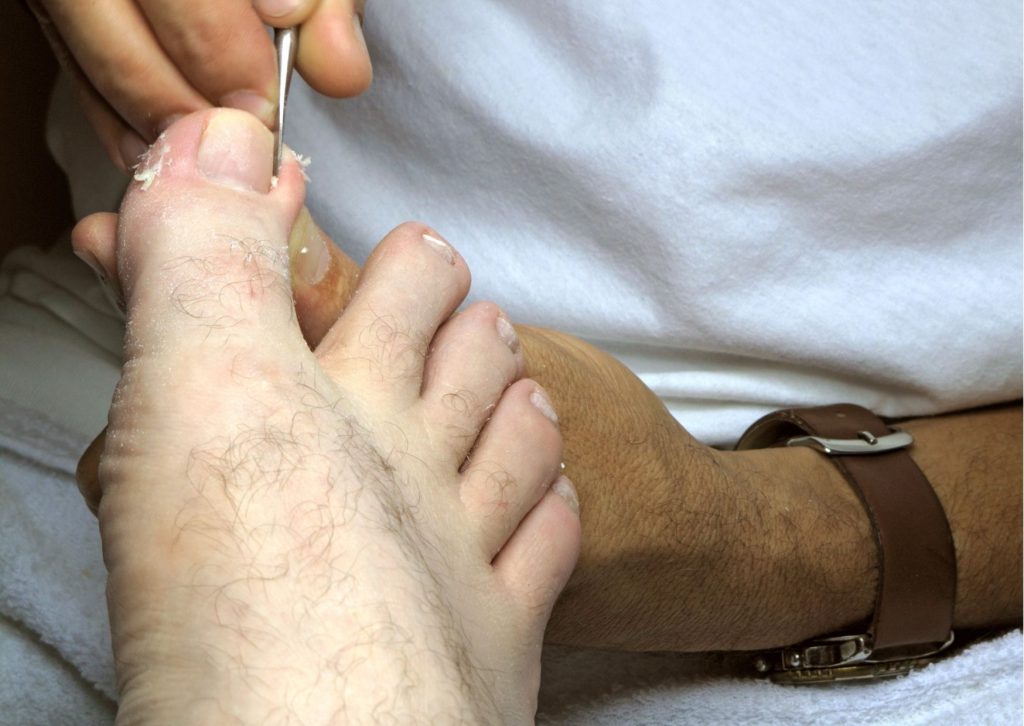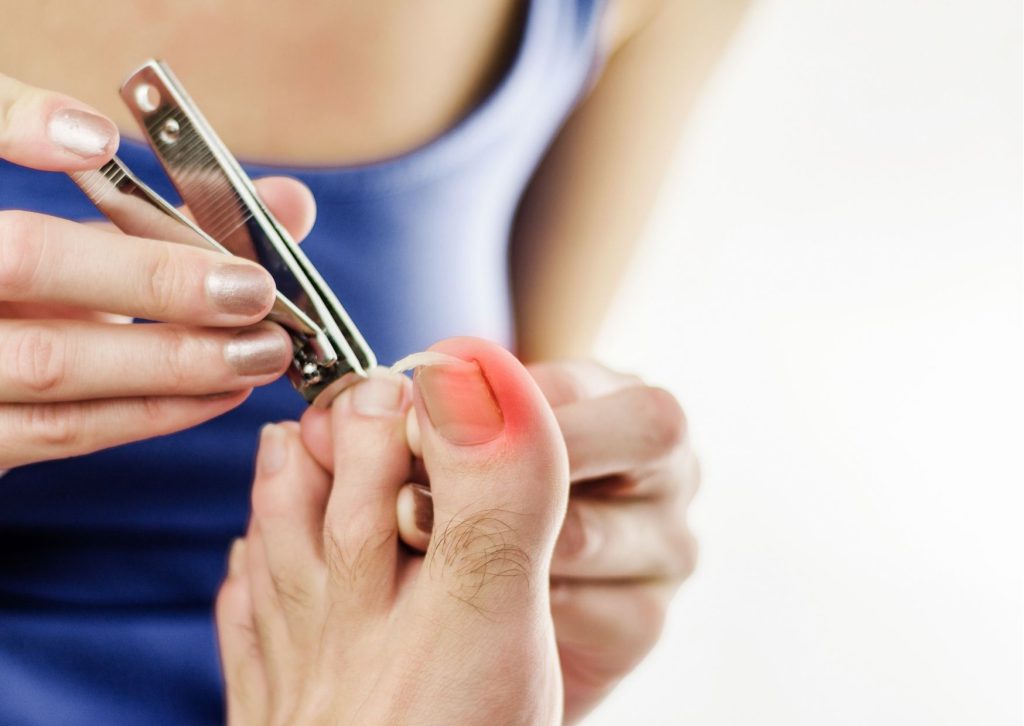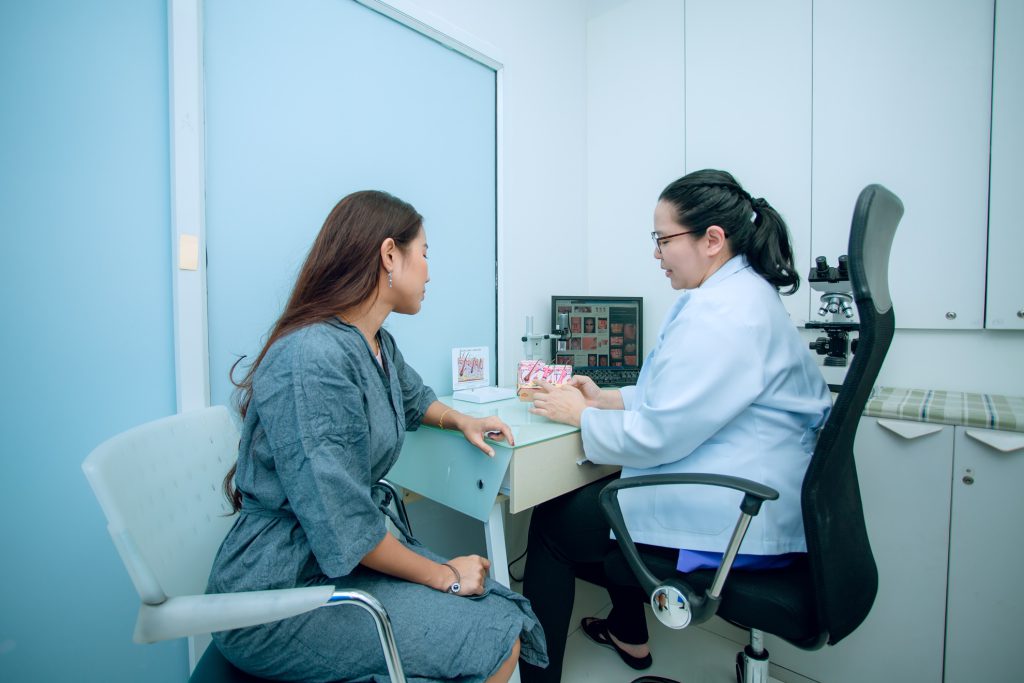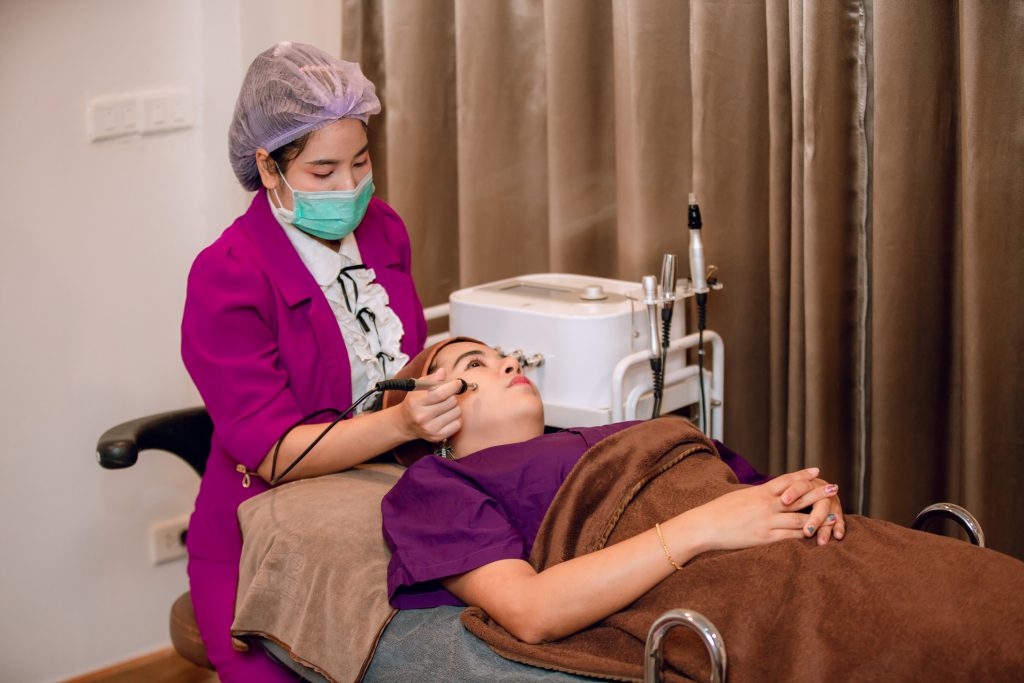Reviews a nail treatment clinic recommended in Nakhon Ratchasima Korat
Nail disease symptoms are common problems. It is a painful symptom for those who encounter this problem. The most common nail diseases are nail infections, inflamed nails, or bacterial accumulation. at the nail area These nail problems If it happens, you should hurry up and get a consultation from a specialist doctor to cure it.
Ingrown toenail disease
Ingrown nail disease is a condition in which the nails grow. and pricked into the skin around the tip of the nail Found more often on toenails than fingernails, especially the big toe. cause pain, followed by, or sometimes may cause infection Symptoms of ingrown toenails are as follows
- sore pain in toes
- Swelling around the toes
- There are red marks around the toes.
- Have pus or blood
- Infection of the tissues of the toes
Causes of Ingrown Toenail Disease
Ingrown toenail disease can be caused by several factors, including:
1. Improper nail trimming
Cutting the toenail too short or rounding the edges can cause the nail to grow into the skin.
2. Trauma
Injury to the toe, such as stubbing it or dropping something on it, can cause the toenail to grow into the skin.
3. Genetics
The shape and curvature of the toenail may be inherited, making some people more prone to developing ingrown toenails.
4. Footwear
Wearing shoes that are too tight or narrow can put pressure on the toenail and cause it to grow into the skin.
5. Foot structure
People with flat feet or other foot abnormalities may be more susceptible to ingrown toenails.
6. Poor hygiene
Ingrown toenails can develop as a result of poor foot hygiene, such as not washing the feet regularly or wearing dirty socks.
7. Medical conditions
Certain medical conditions, such as diabetes or peripheral vascular disease, can affect circulation to the feet and increase the risk of ingrown toenails.
Prevention of ingrown toenails includes proper nail trimming techniques, wearing comfortable shoes that fit well, maintaining good foot hygiene, and seeking prompt medical attention if there are signs of infection or other complications. If you have a history of ingrown toenails or other foot problems, it’s important to speak with a podiatrist or other healthcare professional about preventive measures.
Infected nail disease
Treatment for infected nail diseases depends on the underlying cause and severity of the infection. Options may include oral or topical medications, surgical intervention, or lifestyle changes to improve nail health and prevent further infections. It’s important to seek medical attention promptly if you suspect that you have an infected nail, as untreated infections can spread and cause serious complications. A healthcare professional can provide an accurate diagnosis and recommend appropriate treatment options.
Symptoms of Infected Nail Disease
The symptoms of an infected nail disease can vary depending on the specific condition, but some common signs include:
- Discoloration The affected nail may become yellow, brown, or green.
- Thickening The nail may become thicker and more difficult to trim.
- Change in nail shape The nail may become distorted or misshapen.
- Foul odor The nail may emit a strong, unpleasant odor.
- Pain or discomfort The nail and surrounding skin may be tender, painful, or itchy.
- Swelling or redness The skin around the nail may become swollen, red, or inflamed.
- Pus or discharge If the infection is severe, pus or other fluid may drain from the affected nail.
- Separation of the nail from the nail bed The nail may become detached from the skin underneath it.
Infected nail diseases can be caused by a variety of factors, including fungal or bacterial infections, trauma to the nail or surrounding skin, and underlying medical conditions. It’s important to seek medical attention promptly if you suspect that you have an infected nail, as untreated infections can spread and cause serious complications. A healthcare professional can provide an accurate diagnosis and recommend appropriate treatment options, which may include oral or topical medications, surgery, or lifestyle changes to improve nail health.
Curved nail disease
A curved nail can be a common and benign condition, but in some cases, it may be a sign of an underlying medical condition. If you have a curved nail, it is best to have it evaluated by a licensed medical professional, such as a dermatologist or a primary care physician. Some possible causes of curved nails include trauma or injury to the nail, genetic factors, certain medications, and medical conditions such as iron-deficiency anemia, psoriasis, and thyroid disease. Treatment for a curved nail will depend on the underlying cause and severity of the condition. In some cases, simply trimming the nail regularly or wearing proper-fitting shoes can help alleviate discomfort. However, more severe cases may require medical treatment such as nail removal, oral or topical medications, or surgery.
Symptoms of Curved Nail Disease
Curved nail disease, also known as onychogryphosis, is a condition in which the nail becomes thickened and curved, often resembling a ram’s horn. Some common symptoms of this condition may include:
- Thickening of the affected nail
- Curvature of the nail, often resembling a claw or horn
- Difficulty in trimming or grooming the affected nail
- Pain or discomfort in the affected finger or toe
- Foul odor or discharge from under the affected nail
- Discoloration or darkening of the affected nail
- Increased susceptibility to fungal or bacterial infections
It is important to note that these symptoms can also be indicative of other nail conditions or underlying medical issues, and a proper diagnosis should be made by a licensed medical professional, such as a dermatologist or a primary care physician. If you are experiencing any of these symptoms, it is recommended that you seek medical attention in order to receive an accurate diagnosis and appropriate treatment plan.
If you have treated nails What are the dangers of making a mistake?
Treating nails without proper knowledge or medical supervision can lead to potential risks and complications. Some of the dangers of making a mistake while treating nails include:
1. Delayed diagnosis
Attempting to self-treat nail conditions or using home remedies may delay the proper diagnosis of an underlying medical condition, which could worsen over time.
2. Misdiagnosis
Without proper training and knowledge, it can be easy to misdiagnose a nail condition, leading to the wrong treatment and potentially worsening the condition.
3. Infection
Attempting to treat nails on your own, especially if done improperly, can lead to infection or further spread of an existing infection.
4. Worsening of the condition
Incorrect treatment methods can exacerbate the symptoms of nail diseases or conditions, making them more difficult to treat in the long run.
5. Damage to the nail
Overzealous trimming, filing, or other nail care practices can damage the nail, leading to pain, discomfort, or even permanent damage.
It is always recommended to seek medical advice and guidance from a licensed medical professional, such as a dermatologist or a primary care physician, before attempting to treat nail conditions on your own. This will ensure a proper diagnosis and appropriate treatment plan, minimizing the risks and complications associated with self-treatment.
Hair disease
Hair disease refers to a variety of conditions that affect the scalp, hair follicles, and hair shafts. Some common hair diseases include:
1. Alopecia
This is a condition that causes hair loss, which can be patchy or complete. It can be caused by a variety of factors, including genetics, autoimmune disorders, and certain medications.
2. Dandruff
Dandruff is a common scalp condition that causes flaking and itching. It is often caused by an overgrowth of yeast on the scalp.
3. Psoriasis
Psoriasis is a chronic autoimmune condition that can affect the skin and scalp. It can cause red, scaly patches on the scalp and hair loss in severe cases.
4. Folliculitis
Folliculitis is a condition that causes inflammation and infection of the hair follicles. It can be caused by bacteria, fungi, or viruses.
5. Trichotillomania
Trichotillomania is a psychological condition in which individuals have an irresistible urge to pull out their own hair. It can lead to hair loss and damage to the hair follicles.
Treatment for hair diseases depends on the underlying cause and severity of the condition. Treatment options may include medications, topical creams or shampoos, light therapy, or in severe cases, surgery. It is important to seek medical attention if you are experiencing symptoms of a hair disease, as early intervention can lead to better outcomes.
Skin disease symptoms
Symptoms of skin diseases can vary depending on the specific condition, but some common signs include:
- Rash A rash is a change in the color or texture of the skin, which can appear as redness, bumps, blisters, or scaling.
- Itching or burning Skin diseases often cause itching or burning sensations, which can be mild to severe.
- Dry or scaly skin Skin diseases such as eczema and psoriasis can cause dry, scaly patches on the skin.
- Swelling Some skin diseases can cause swelling or inflammation in the affected area.
- Pain or discomfort Skin diseases such as shingles or herpes can cause pain or discomfort in the affected area.
- Blisters or sores Certain skin diseases such as herpes or impetigo can cause blisters or sores on the skin.
- Discoloration Some skin diseases can cause changes in skin color, such as a darkening or lightening of the skin.
It’s important to seek medical attention if you suspect that you have a skin disease, as early diagnosis and treatment can often lead to better outcomes. A healthcare professional can provide an accurate diagnosis and recommend appropriate treatment options.
Advantages of nail treatment at SevenPlus Clinic and D’secert Clinic
Both SevenPlus Clinic and D’secert Clinic offer professional nail treatment services with various advantages:
Advantages of SevenPlus Clinic nail treatment:
1. Experienced nail technicians
SevenPlus Clinic has a team of experienced and skilled nail technicians who use high-quality products and techniques to provide top-notch nail care services.
2. Wide range of services
SevenPlus Clinic offers a wide range of nail services including nail art, gel nail extensions, acrylic nail extensions, and nail repair.
3. Relaxing atmosphere
The clinic provides a relaxing atmosphere to ensure a comfortable and enjoyable experience for their clients.
4. Strict hygiene standards
SevenPlus Clinic follows strict hygiene standards to ensure the safety and health of their clients.
Advantages of D’secert Clinic nail treatment:
1. Holistic approach
D’secert Clinic takes a holistic approach to nail treatment, focusing not only on the aesthetic aspect but also on the health of the nails and surrounding skin.
2. Customized treatment
The clinic provides customized treatment plans based on the individual needs and concerns of their clients.
3. High-quality products
D’secert Clinic uses high-quality products that are safe and effective for the nails and skin.
4. Professional and friendly staff
The clinic has a team of professional and friendly staff who are knowledgeable and skilled in their field.
Dr. Marinya Pongpudpunth
Education of Dr. Marinya Pongpudpunth
- Hair Restoration Training, Korea (2015)
- Thai Board of Dermatology, Ramathibodi Hospital (2013)
- Board of Dematopathology, Boston University, USA (2009)
- Master of Science in Dermatology, Boston University, USA (2006)
- Doctor of Medicine, Mahidol University (2001)
- Nail surgery training
- Laser expert training
- Hair expert training
- Boton university usa
Work experience of Dr. Marinya Pongpudpunth
- Dermatologist Mae Fah Luang Hospital
- Dermatologist Ramathibodi Hospital
- Dermatologist, Samitivej Hospital
- Dermatologist, Bangkok Hospital
Treatment of nail disease near, Korat must be done at SevenPlus Clinic and D’secert Clinic.
If you are in the Korat area and are in need of treatment for a nail disease, Seven plus Clinic and D’Secret Clinic are excellent options for professional and effective treatment.
SevenPlus Clinic
Seven plus Clinic has a team of experienced nail technicians who are skilled in identifying and treating various nail diseases. They use high-quality products and techniques to provide top-notch nail care services. Additionally, the clinic follows strict hygiene standards to ensure the safety and health of their clients.
D’secert Clinic.
D’secert Clinic takes a holistic approach to nail treatment, focusing not only on the aesthetic aspect but also on the health of the nails and surrounding skin. They provide customized treatment plans based on the individual needs and concerns of their clients. The clinic uses high-quality products that are safe and effective for the nails and skin, and has a team of professional and friendly staff who are knowledgeable and skilled in their field.
Whether you choose SevenPlus Clinic or D’secert Clinic, you can be sure that you will receive the best quality.









